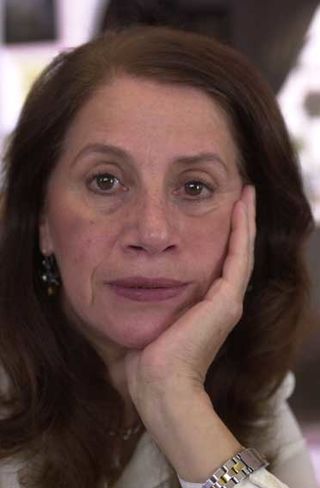
María Celeste Arrarás Mangual, better known as María Celeste, is a Puerto Rican broadcast journalist, author, and television personality, who has won three national Emmy Awards for journalism. In 2005, she became the first female recipient of the Legacy Award by Broadcast and Multi Channel for outstanding achievement in Hispanic Television. In 2006, Arrarás was included on the cover of Newsweek magazine, as one of the 20 most powerful women of the next generation of leaders.” In August 2018, María Celeste was awarded with a Doctorate Honoris Causa from the Universidad Central de Bayamon in Puerto Rico, in recognition for her philanthropic work. Until August 2020, Arrarás spent two decades as the host and managing editor of Al Rojo Vivo con María Celeste. Her program aired daily in the U.S. and in 15 Latin American countries, for a total daily audience of 35 million viewers. Her popularity has made her one of the most influential Hispanic figures in social platforms, with millions of followers around the world and in 2019 she made her debut in the Hollywood Reporter's Social Climber Chart at #5 of all TV Personalities. ,

Gloria de los Ángeles Treviño Ruiz, known as Gloria Trevi, is a Mexican singer, songwriter, dancer, actress, television hostess, music video director and businesswoman known as "The Supreme Diva of Mexican Pop". Since 1998, her name has been linked to the Trevi-Andrade Clan, an organization with sectarian overtones accused of sexual abuse, corruption of minors and labor exploitation, led by Trevi's former representative, Sergio Andrade.

María Elena Salinas, is an American broadcast journalist, news anchor, and author. Called the "Voice of Hispanic America" by The New York Times, Salinas is one of the most recognized Hispanic female journalists in the United States. She was the co-anchor of Noticiero Univision, the primary evening news broadcast on Univision, and the co-host of the news magazine program Aquí y Ahora.

Niurka Marcos Calle is a Cuban-born Mexican vedette, actress, dancer and singer.
Danzón is the official musical genre and dance of Cuba. It is also an active musical form in Mexico and Puerto Rico. Written in 2
4 time, the danzón is a slow, formal partner dance, requiring set footwork around syncopated beats, and incorporating elegant pauses while the couples stand listening to virtuoso instrumental passages, as characteristically played by a charanga or típica ensemble.

The Sea Inside is a 2004 Spanish psychological drama film co-written and directed by Alejandro Amenábar, who also co-produced, scored and edited. It is based on the real-life story of Ramón Sampedro, who was left quadriplegic after a diving accident, and his 28-year campaign in support of euthanasia and the right to end his life. The film won the Academy Award for Best Foreign Language Film.

Rina is a Mexican telenovela produced by Valentín Pimstein for Televisa. It was written by Inés Rodena and starring Ofelia Medina as a eponymous hunchback, Enrique Álvarez Félix as her love interest and María Rubio as the main villain of the history. It is based on the radionovela "Enamorada".

Love is the third studio album by Mexican singer Thalía, released on 7 October 1992, by the previously owned Televisa record label, Melody/Fonovisa, which now belongs to Univision Music Group. It was produced by the Spanish songwriter and producer Luis Carlos Esteban. The album was released in Mexico, some Central-American countries, the United States, Spain, Greece and Turkey. In Mexico, two different versions of Love were released and later it would sell over 500,000 there, becoming her most successful album till the release of Primera Fila which sold over 600,000.

María Elena Enríquez Ruiz, known as Helena Rojo, is a Mexican actress and model.

María de Lourdes Rojo e Incháustegui, commonly known as María Rojo, is a Mexican actress and politician. She was Senator of the Republic in the upper house of Mexican Congress. She debuted during the Golden Age of Mexican cinema.

Destilando Amor is a Mexican telenovela produced by Nicandro Díaz González for Televisa in 2007. It is a remake of the 1994 Colombian telenovela Café, con aroma de mujer.

Elizabeth Ann Sheridan Scarbrough, better known as Beatriz Sheridan was a Mexican actress and director. A pioneer of the Mexican telenovelas and prominent figure of the Mexican theater of the 20th century, she was also a teacher of dramatic technique for television and directed many great dramatic stars.

María Arrillaga is a Puerto Rican poet who has been a professor at the University of Puerto Rico. She taught in the Spanish Department on the Rio Piedras campus. She is a member of PEN American Center as well as PEN Club de Puerto Rico. She was a member of the Women's Writing Committee of PEN International, served as its secretary and organizer for Latin America. Arrillaga was president of PEN Club de Puerto Rico during 1989–1991.
María Rojo is a Mexican actress and politician. She was born in Mexico City. Rojo began her career in Mexico, with a role on Teatro Fantástico TV series, before starring in films, such as: Las poquianchis, in 1976; Rojo amanecer, in 1989; El callejón de los milagros, in 1995; El Infierno, in 2010.

Aura Cristina Geithner is a Colombian actress, model, singer and philanthropist. In her teens, she lived in Mexico and studied painting and international public relations. Her twin brother, Harry Geithner, is also an actor.

A vedette is the main female artist of a show derived from cabaret and its subcategories of revue, vaudeville, music hall or burlesque. The purpose of the vedette is to entertain and captivate the public. Vedettes are expected to sing, dance and act on stage. Particularly accomplished artistes are considered super vedettes or first vedettes. Vedettes often appear alongside groups of dancers, flashy and revealing costumes, magicians, comedians, jugglers, or even performing animals. Vedettes specializing in burlesque generally do striptease and may also perform nude on stage.

María Novaro is a Mexican film director. She was among the first generation of female filmmakers to graduate from a film school in Mexico. She has made five feature films and fourteen short films. Within the Mexican film industry, she has been a cinematographer, sound mixer, director, screenwriter and editor. Today, Novaro is one of the best known Mexican filmmakers to come out of the New Mexican Cinema and her films express Millian's idea of cinema in feminine.

Rita Macedo was a Mexican actress and dressmaker. She was nominated for an Ariel Award for her 1956 performance in "Ensayo de un crimen" and in 1991 for a TVyNovelas Prize for "Alcanzar una estrella". She won the Best Actress Ariel Award in 1972 for "Tú, yo, y nosotros". She was married to a pioneer of Mexican radio, television and film, Luis de Llano Palmer, by whom she had two children, Julissa, an actress and musician, and Luis de Llano Macedo, renowned telenovela producer. She also was instrumental in bringing many works of international writers to the Mexican stage.

Doña Flor y sus dos maridos, is a Mexican telenovela produced by Eduardo Meza for Televisa that premiered on Las Estrellas on 25 March 2019 and ended on 21 June 2019. The show is based on the 1966 Brazilian novel of the same name written by Jorge Amado. Production began on 22 November 2018 in Mexico City, and it stars Ana Serradilla, Sergio Mur, and Joaquín Ferreira.

Marta Aura was a Mexican actress.


















